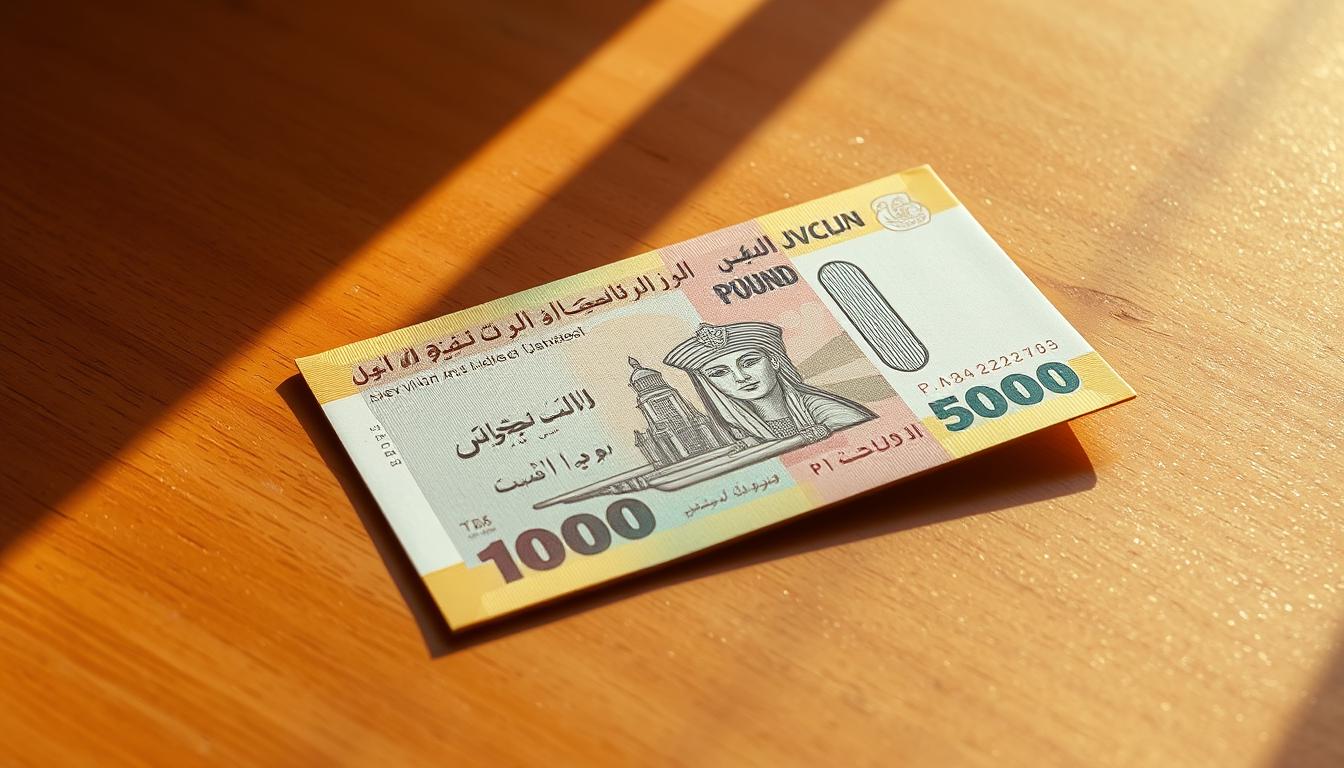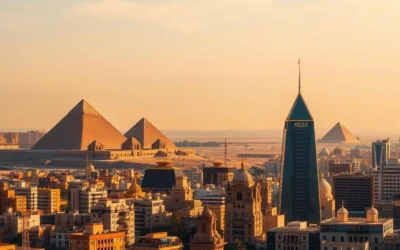✓ Accommodations ✓ Flights ✓ Rental Cars ✓ Tours & Activities
Did you know that nearly 70% of transactions in this fascinating country are still conducted in cash? Whether you’re exploring ancient pyramids or bustling markets, understanding the local currency is key to a hassle-free adventure.
The Egyptian pound (EGP) is the official currency, divided into 100 piastres. While cards are widely accepted in cities, cash remains essential for rural areas and local markets. Knowing where to exchange money and how to avoid hidden fees can save you time and stress.
This guide will help you navigate the financial details of your trip, from finding secure ATMs to getting the best exchange rate. With these tips, you’ll be ready to explore confidently and make the most of your journey.
Introduction: Prepare for Your Egyptian Adventure
Handling money in a new country can be tricky, but with the right preparation, you’ll avoid common pitfalls. This guide will help you navigate the financial aspects of your trip, ensuring a smooth and stress-free experience.
Overview of Currency Challenges
One of the biggest hurdles travelers face is finding favorable exchange rates. Many tourists end up paying extra fees or receiving less value for their money. Additionally, while credit cards are widely accepted in cities, rural areas often rely on cash.
Here’s a quick look at common issues:
- Unfavorable rates at airports or hotels.
- Limited access to ATMs in remote areas.
- Hidden fees for card transactions.
What You Will Learn on This Journey
This guide will equip you with essential knowledge to handle local currency confidently. You’ll discover:
- How to secure the best exchange rate.
- Where to use cards and where cash is king.
- Tips for avoiding high fees at ATMs and banks.
“Being informed about local payment methods is the key to a hassle-free trip.”
By the end of this guide, you’ll feel prepared to handle any financial challenges during your adventure. Whether you’re dining at a restaurant, shopping at a market, or exploring remote areas, you’ll know the best way to pay.
| Payment Method | Best Use Case |
|---|---|
| Cash | Markets, rural areas, tips |
| Credit Card | Hotels, restaurants, tours |
| ATM | Withdrawing local currency |
Understanding the Egyptian Pound (EGP) and Local Currency
Navigating the local currency system is a crucial step for any trip abroad. The Egyptian pound (EGP) is the official currency, divided into 100 piastres. Knowing the basics of this currency will help you manage your money efficiently during your stay.
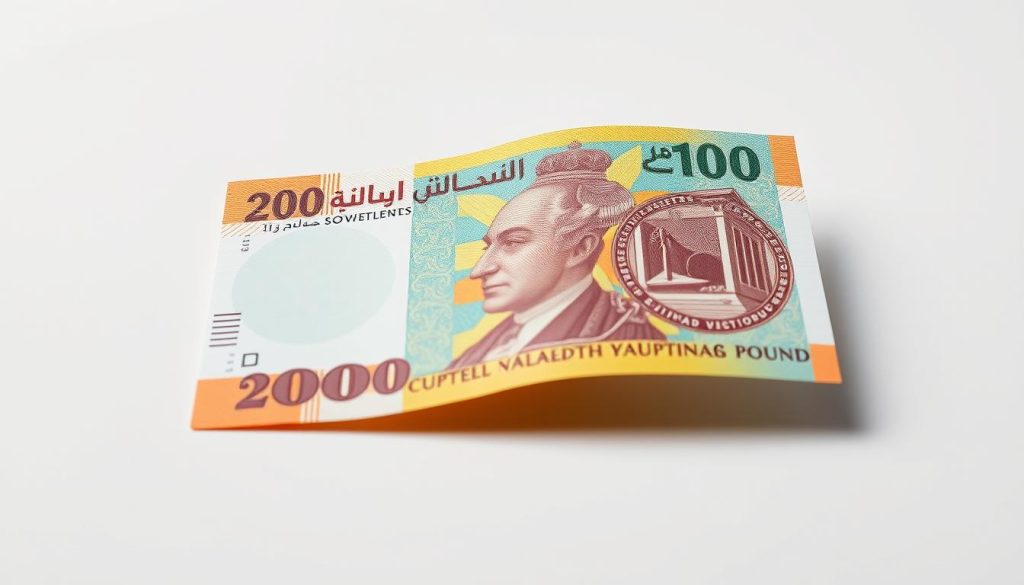
Currency Denominations and Symbols
The Egyptian pound comes in both banknotes and coins. Banknotes are available in denominations of 1, 5, 10, 20, 50, 100, and 200 EGP. Coins are less commonly used but include 25 and 50 piastres. The currency code is EGP, and the symbol is £, which can be confusing for those used to the British pound.
To identify genuine currency, look for watermarks, security threads, and raised print. These features are standard on all banknotes and help prevent counterfeiting.
Basics of Converting Your Money
Converting your home currency into EGP is straightforward. Use exchange offices or ATMs for the best rates. Avoid airports and hotels, as they often charge higher fees. As of now, 1 USD equals approximately 49 EGP, but rates can fluctuate.
Here are some quick tips for managing your money:
- Carry small denominations for everyday expenses.
- Use cards in cities but keep cash for rural areas.
- Check for hidden fees when using ATMs or exchanging money.
By understanding the local currency system, you’ll be better prepared for a smooth and enjoyable trip.
How to Secure Favorable Exchange Rates in Egypt
Getting the best exchange rate can make a big difference during your travels. Many travelers unknowingly lose money by purchasing currency before arriving. Instead, waiting until you reach your destination often yields better rates.
Strategies for Avoiding Pre-Trip Currency Purchases
Buying currency in advance might seem convenient, but it often comes with poor rates. Airports and hotels typically charge higher fees, leaving you with less value for your money. Instead, use local ATMs or reputable banks for better deals.
Here’s why waiting pays off:
- Local ATMs offer mid-market rates, saving you money.
- Reputable banks provide transparent fees and fair rates.
- You avoid the markup often charged by pre-trip exchange services.
Recognizing and Avoiding Hidden Fees
Hidden fees can quickly eat into your budget. Always check for additional charges when using ATMs or exchanging currency. Some services may advertise low rates but add fees later. Look for transparent options to avoid surprises.
Here are common fees to watch for:
- ATM withdrawal fees, especially at non-bank locations.
- Dynamic currency conversion charges when using cards.
- Service fees at exchange offices or airports.
“Choosing the right exchange method can save you time and money, making your trip more enjoyable.”
By following these tips, you’ll secure the best possible exchange rate and avoid unnecessary costs. Whether you’re withdrawing cash or using a card, being informed ensures a stress-free financial experience.
Optimal Payment Methods: Cash and Credit Card Usage
Balancing cash and card usage is essential for a smooth travel experience. Knowing when to use each method can save you time and ensure convenience during your trip. While cards are widely accepted in many places, cash remains crucial for smaller transactions and emergencies.
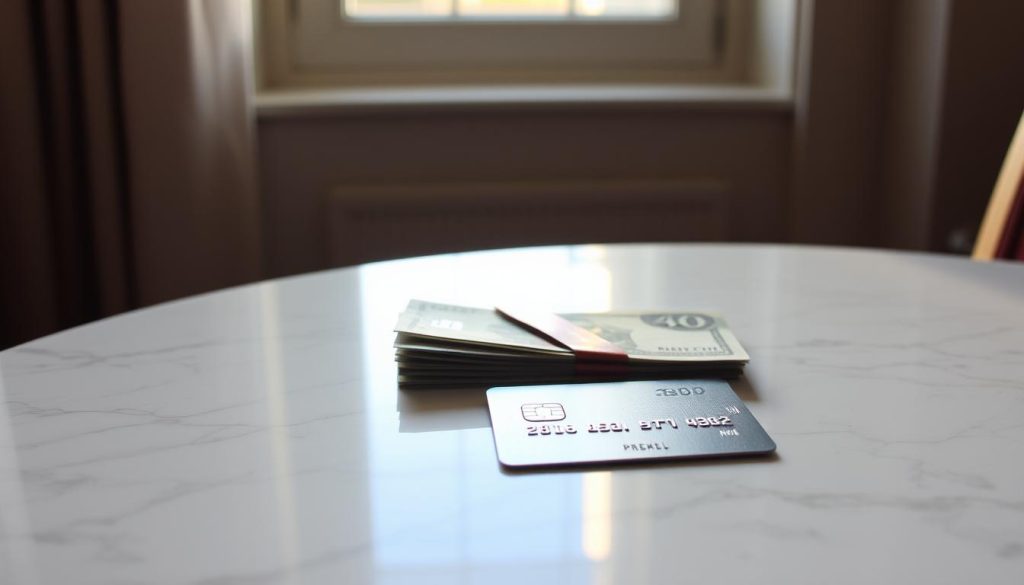
Where Cards Are Widely Accepted
In major cities, credit and debit cards are commonly used in upscale restaurants, international hotels, and tourist shops. Visa and Mastercard are widely accepted, making them a convenient option for larger purchases or dining out. For example, many hotels and restaurants in popular tourist areas prefer card payments for their ease and security.
However, it’s always a good idea to carry some local currency as a backup. Some smaller establishments or rural areas may not accept cards, so having cash on hand ensures you’re prepared for any situation.
Importance of Carrying Cash
Cash is king for everyday transactions, especially in markets, local shops, and rural areas. It’s also essential for tipping, bargaining, and small purchases like snacks or transportation. Many vendors and service providers prefer cash, so having enough Egyptian pounds can make your trip more seamless.
Here are a few tips for managing both payment methods:
- Use cards for larger expenses like hotels or tours.
- Keep small denominations of cash for tips and small purchases.
- Carry a mix of both to ensure you’re covered in any situation.
By balancing cash and card usage, you’ll navigate your trip with ease and avoid unnecessary stress. Whether you’re dining at a restaurant or exploring a local market, having the right payment method ensures a smooth experience.
Navigating ATMs in Egypt for Hassle-Free Withdrawals
Accessing cash during your travels doesn’t have to be stressful with the right preparation. ATMs are widely available in major cities like Cairo and Alexandria, making it easy to withdraw Egyptian pounds when needed. However, knowing how to use them safely and efficiently can save you time and money.
Finding and Using Secure ATM Locations
When withdrawing cash, always choose ATMs located in secure areas. Opt for machines inside banks, shopping malls, or reputable hotels. These locations are safer and less likely to have skimming devices. Avoid standalone ATMs in poorly lit or isolated areas.
Before your trip, notify your bank about your travel plans. This prevents your card from being blocked due to suspicious activity. Additionally, check if your bank has partnerships with local institutions to reduce or waive withdrawal fees.
- Use ATMs affiliated with major networks like Visa or Mastercard.
- Cover your PIN entry to protect against theft.
- Stay alert and avoid distractions while using the machine.
Overcoming Daily Withdrawal Limits
Most ATMs in Egypt have daily withdrawal limits, typically ranging from 2000 to 3000 EGP. If you need more cash, plan to make multiple withdrawals. Keep in mind that some machines may charge a small fee, usually around 5 EGP per transaction.
If your card is rejected, try a different ATM or use another card. Some machines may not accept certain card types, so having a backup is a smart move. Always choose to withdraw in the local currency to avoid unfavorable exchange rates.
“Planning ahead and staying informed ensures a smooth cash withdrawal experience during your trip.”
By following these tips, you’ll feel confident managing your cash needs and focus on enjoying your adventure. Whether you’re exploring bustling cities or remote areas, accessing money will be a stress-free part of your journey.
Maximizing Your Travel Budget with The Wise Egyptian Pound Card
Traveling with the right financial tools can transform your experience. The Wise Egyptian Pound Card is designed to make managing your money abroad simple and cost-effective. With features like real-time currency conversions and no hidden fees, it’s a smart choice for savvy travelers.
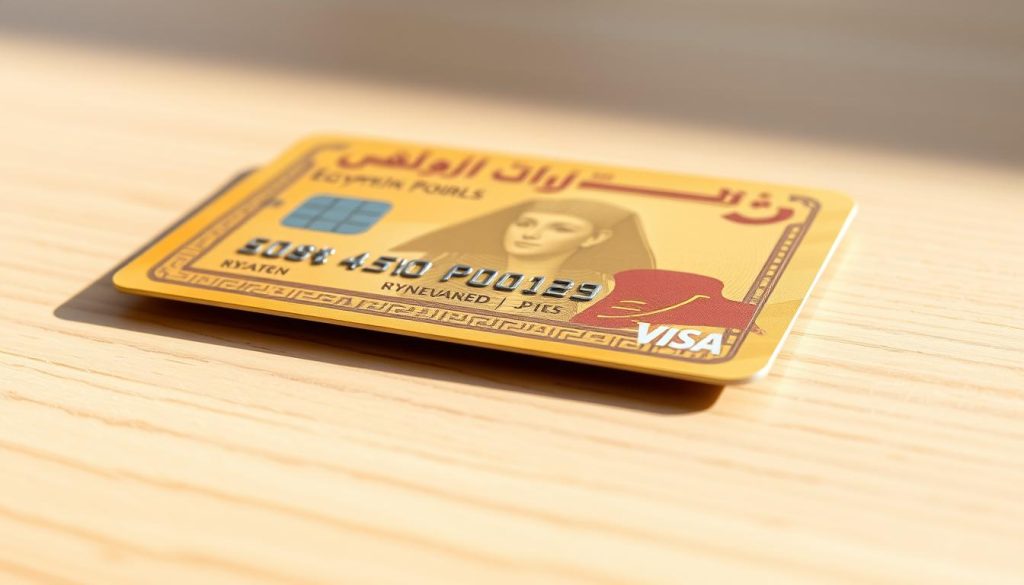
Benefits of Using a No-Fee Debit Card
The Wise card eliminates unnecessary fees, saving you money on every transaction. Unlike traditional banks, it offers the mid-market rate for currency exchanges. This means you get the fairest value for your egyptian pound without extra charges.
Here’s why it stands out:
- Instant top-ups in your local currency.
- No foreign transaction fees or ATM withdrawal charges.
- Easy online management through the Wise app.
Real-Time Currency Conversions and Savings
With the Wise card, you can convert your currency in real-time. This feature ensures you always know the exact amount you’re spending. It’s especially useful for avoiding dynamic currency conversion fees at ATMs or during card payments.
For example, if you’re dining at a restaurant or shopping at a market, the card automatically converts your funds at the best available rate. This saves you both time and money during your travel.
| Feature | Wise Card | Traditional Banking |
|---|---|---|
| Exchange Rate | Mid-market rate | Marked-up rate |
| Fees | No hidden fees | Foreign transaction fees |
| Convenience | Real-time conversions | Manual conversions |
“The Wise card simplifies your finances, letting you focus on enjoying your trip without worrying about hidden costs.”
By choosing the Wise Egyptian Pound Card, you’ll maximize your budget and enjoy a seamless financial experience. Whether you’re exploring bustling cities or remote areas, this card ensures you’re always in control of your money.
Avoiding Hidden Fees and Exchange Rate Markups
Hidden fees and unfavorable exchange rates can quickly eat into your travel budget if you’re not careful. Being aware of common pitfalls like dynamic currency conversion and markups can save you significant money during your trip. Here’s how to stay ahead of these costs and make the most of your spending.
Insider Tips on Dynamic Currency Conversion
Dynamic currency conversion (DCC) occurs when you’re given the option to pay in your home currency instead of the local one. While it might seem convenient, it often comes with hidden fees and poor exchange rates. Always choose to pay in the local currency to avoid these extra costs.
Here’s why DCC can be costly:
- It uses a marked-up exchange rate, which is less favorable than the mid-market rate.
- Additional service fees are often added, increasing the total cost.
- You lose control over the conversion process, leading to unnecessary expenses.
For example, if you’re dining at a restaurant or shopping at a market, the machine might prompt you to pay in your home currency. Politely decline and opt for the local currency instead.
Recognizing and Avoiding Surcharges
Many ATMs and card payment systems add surcharges that aren’t immediately visible. These fees can range from 2% to 5% of the transaction amount, adding up over time. To avoid them, always check for transparent fee structures before making a payment.
Here are some tips to spot hidden fees:
- Review the terms and conditions of your card provider for foreign transaction fees.
- Look for ATMs affiliated with major banks or networks to minimize extra charges.
- Confirm the exchange rate before finalizing any transaction.
“By staying informed and choosing the right payment methods, you can avoid unnecessary fees and keep your travel budget intact.”
Understanding these practices ensures you’re not overpaying for services or purchases. Whether you’re withdrawing cash or making a card payment, being proactive about fees can make a big difference.
Local Payment Practices: Purchasing, Tipping, and Cultural Etiquette
Understanding local payment customs can make your travel experience smoother and more enjoyable. In many places, tipping, known as baksheesh, is a deeply rooted practice. It’s not just about showing appreciation—it’s a vital part of the service industry.
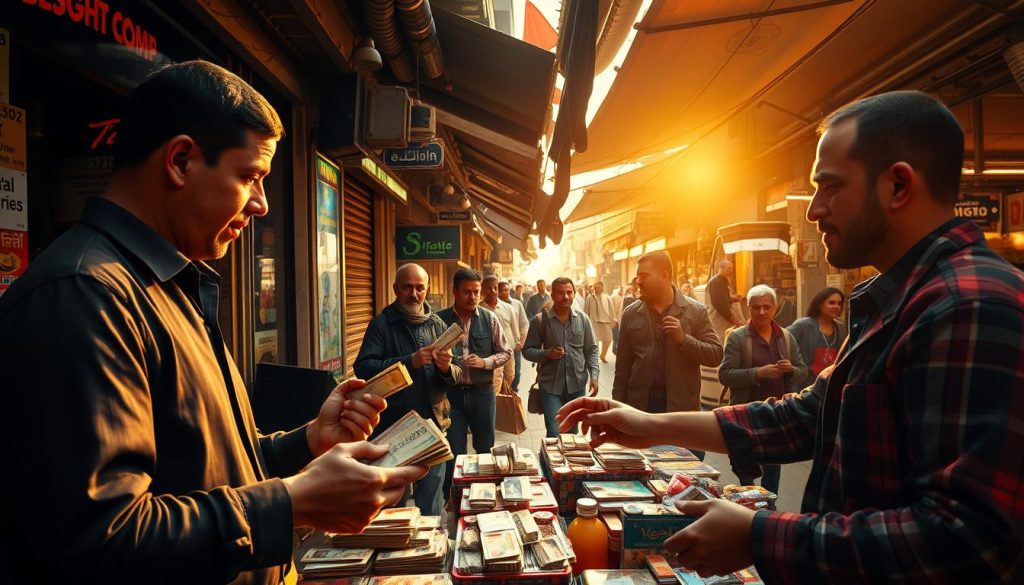
Understanding the Custom of Baksheesh
Baksheesh is more than a tip—it’s a way of life. Many workers rely on these small payments to supplement their income. Whether it’s a restaurant server, a taxi driver, or a tour guide, tipping is expected and appreciated.
Here’s how to navigate this custom:
- Always carry small bills in the local currency for quick tips.
- For restaurants, 10-15% of the bill is standard if no service charge is included.
- For tours, consider tipping guides 100-200 EGP per day, depending on the quality of service.
Tips for Restaurant, Taxi, and Tour Payments
When dining out, rounding up the bill or adding a small tip is common. For taxi rides, rounding up the fare or adding 5-10 EGP is a polite gesture. On tours, tipping is a way to show gratitude for a memorable experience.
Here are some practical suggestions:
- For hotel staff, 20-30 EGP per service is appropriate.
- For private drivers, $5-$15 per day is a good range.
- For smaller services, like restroom attendants, 1-2 EGP is sufficient.
“Tipping is not just about money—it’s about showing respect and appreciation for the people who make your trip special.”
By understanding these practices, you’ll blend in seamlessly and ensure your travel experience is both enjoyable and respectful. Always remember, a little kindness goes a long way.
Budgeting Your Trip: Estimating Your Cash Needs in Egypt
Planning your budget for a trip doesn’t have to be overwhelming—knowing your daily expenses can make all the difference. Whether you’re exploring bustling cities or serene rural areas, having a clear idea of your spending will help you stay on track.
Daily Spending Estimates and Emergency Funds
Your daily expenses will vary depending on your travel style. For budget travelers, $15-$40 per day covers meals, transportation, and basic activities. Mid-range travelers might spend $30-$50 daily, while luxury travelers can expect costs of $50-$150 or more.
Here’s a quick breakdown of common expenses:
- Accommodation: Budget options start at $10 per night, while luxury hotels can cost $300 or more.
- Meals: Street food is as low as $1, while fine dining can range up to $100 per meal.
- Transportation: Public buses cost $0.15-$0.50 per ride, while taxis charge $0.20-$0.30 per kilometer.
It’s also wise to set aside an emergency fund. Unexpected expenses, like medical needs or last-minute tours, can arise. A good rule of thumb is to carry an extra $200-$300 for emergencies.
Managing Expenses by Region
Spending can vary significantly by location. In major cities like Cairo, prices for meals and tours are higher. In rural areas, costs are lower, but access to ATMs and card payment options may be limited.
For example, a guided tour in Cairo might cost $50-$150, while similar tours in rural areas could be half the price. Always carry small bills in the local currency for tips and small purchases.
| Expense | Budget | Mid-Range | Luxury |
|---|---|---|---|
| Accommodation | $10-$50 | $50-$150 | $150-$700+ |
| Meals | $5-$15 | $15-$30 | $30-$100+ |
| Transportation | $5-$10 | $10-$20 | $20-$50+ |
“A well-planned budget ensures you can enjoy your trip without financial stress.”
By estimating your daily expenses and preparing for unexpected costs, you’ll feel confident managing your money during your adventure. Whether you’re dining at a restaurant or exploring a local market, smart budgeting ensures a smooth and enjoyable experience.
Currency Exchange at Airports and Local Bureaus
Choosing where to exchange your money can significantly impact your travel budget. While airports offer convenience, local bureaus might provide better rates. Understanding the trade-offs between these options ensures you get the most value for your money.
Pros and Cons of Airport Exchanges
Airport exchange bureaus are known for their convenience, especially after a long flight. They operate under government-set rates, ensuring consistency. However, these rates are often less favorable compared to local options.
Here’s a quick breakdown:
- Pros: Open 24/7, no need to search for locations, and reliable rates.
- Cons: Higher fees, less competitive exchange rates, and limited negotiation options.
For example, exchanging $100 at an airport might give you fewer Egyptian pounds than at a local bureau. Always weigh the convenience against the cost.
Alternative Options at Local Exchange Offices
Local exchange offices often offer better rates and lower fees. They are ideal for travelers who want to maximize their currency conversion. However, these offices may require additional steps, like showing your passport.
Here’s what to consider:
- Pros: Better rates, potential for negotiation, and lower fees.
- Cons: Limited hours, possible hidden fees, and the need for identification.
For instance, a local bureau might offer a rate closer to the mid-market value, saving you money. Always ask about fees upfront to avoid surprises.
| Feature | Airport Exchange | Local Bureau |
|---|---|---|
| Exchange Rate | Government-set, less favorable | Closer to mid-market rate |
| Fees | Higher | Lower |
| Convenience | 24/7, easy access | Limited hours, requires search |
| Identification | Not always required | Passport often needed |
“Choosing the right exchange method can save you time and money, making your trip more enjoyable.”
By understanding the pros and cons of each option, you can make an informed decision. Whether you prioritize convenience or cost, planning ahead ensures a smooth financial experience during your travels.
Payment Solutions in Tourist vs Rural Areas
Exploring a new destination often means adapting to different payment methods. In well-developed tourist areas, using cards is convenient and widely accepted. However, in remote locations, cash remains the preferred way to pay. Understanding these differences ensures a smooth financial experience during your travels.
Using Cards in Major Cities
In bustling cities like Cairo and Alexandria, cards are a practical choice. Upscale restaurants, international hotels, and shopping centers often accept Visa and Mastercard. This makes it easy to manage larger expenses without carrying too much cash.
Here are some examples of where cards are commonly used:
- Hotels and resorts for booking and dining.
- Restaurants in tourist-centric areas.
- Large retail stores and shopping malls.
Reliance on Cash in Remote Locations
In rural areas, cash is still king. Many local markets, small shops, and transportation services only accept physical currency. This is especially true in less developed regions where card payment systems are not widely available.
Here’s why cash is essential in these areas:
- Limited access to ATMs or card machines.
- Local vendors often prefer cash for small transactions.
- It’s a reliable backup if card systems fail.
“Being prepared with the right payment method ensures you’re ready for any situation, whether in a bustling city or a quiet village.”
To stay prepared, carry a mix of cards and cash. Use cards in cities but keep enough local currency for rural areas. This way, you’ll enjoy your trip without worrying about payment issues.
Egypt: Ultimate Travelers Guide to Currencies & Payments
Managing your finances effectively while traveling ensures a seamless and enjoyable experience. By following a few simple strategies, you can avoid common pitfalls and make the most of your budget. Here’s a quick recap of the essential tips:
Essential Strategies for Handling Money
First, always carry a mix of cash and cards. While cards are convenient in cities, cash is essential for rural areas and small transactions. Use ATMs affiliated with major banks to avoid high fees and ensure secure withdrawals.
Second, be mindful of exchange rates. Avoid exchanging money at airports or hotels, as they often charge higher fees. Instead, use local bureaus or ATMs for better rates. Declining dynamic currency conversion when using cards can also save you money.
Finally, keep small bills for tips and everyday expenses. Tipping, or baksheesh, is a common practice and shows appreciation for services rendered.
Benefits of Modern Payment Tools
Using tools like the Wise card can simplify your financial experience. It offers real-time currency conversions and no hidden fees, ensuring you get the best value for your money. This is especially useful for frequent travelers who want to avoid unnecessary costs.
“Smart money management is the key to a stress-free and enjoyable trip.”
Final Advice for a Stress-Free Trip
To wrap up, always plan ahead. Set a daily budget, carry an emergency fund, and keep your money in separate places to minimize risk. By staying informed and prepared, you’ll feel confident navigating any financial challenges during your travels.
Remember, a little preparation goes a long way. Whether you’re dining at a restaurant or exploring a local market, these tips will help you make the most of your adventure.
Conclusion
Planning your finances before your trip ensures a stress-free adventure. Being well-prepared helps you avoid unexpected costs and focus on enjoying your journey. Whether you’re exploring bustling cities or quiet villages, knowing how to manage your money makes all the difference.
Refer back to this guide whenever you need tips on securing the best exchange rates or choosing the right payment methods. Smart financial decisions lead to a smoother and more enjoyable experience.
Thank you for joining us on this comprehensive financial journey. We hope these insights help you feel confident and ready for your next adventure. For more travel tips, explore our other guides and make your trips even more memorable!
The above is subject to change.
Check back often to TRAVEL.COM for the latest travel tips and deals.
Here are some Tours & Sightseeing suggestions that might pique your interests!
